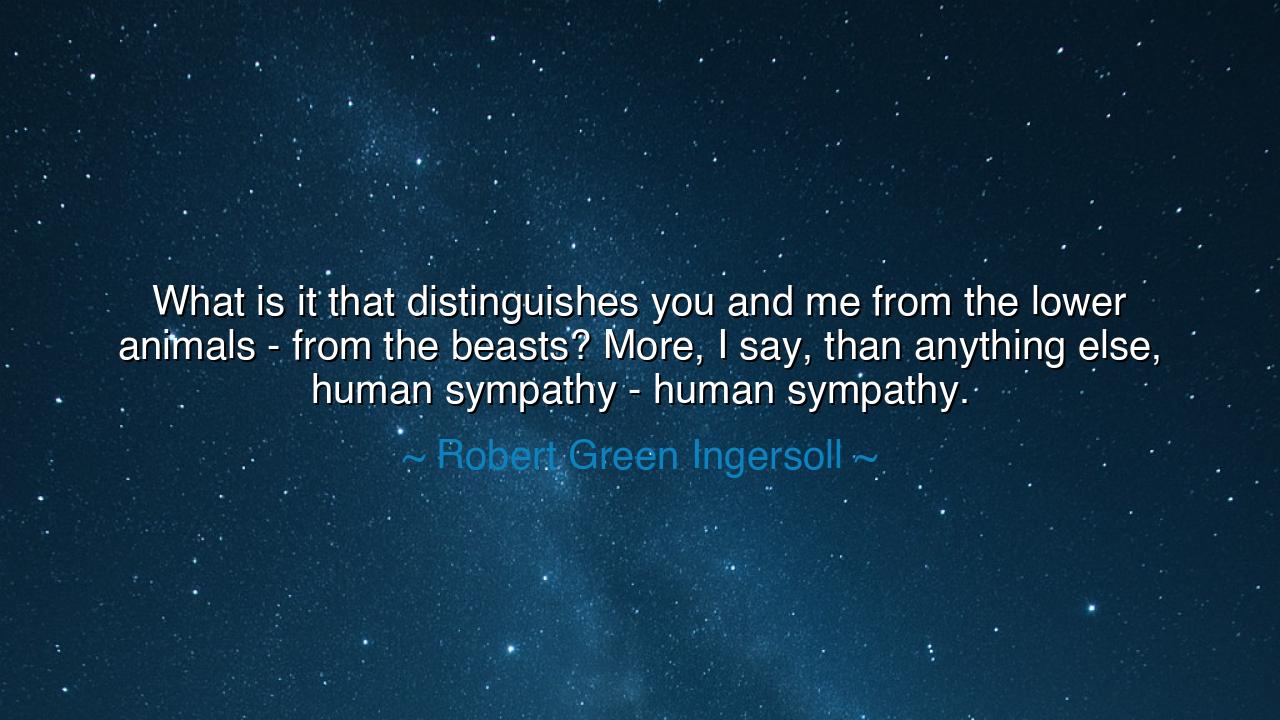
What is it that distinguishes you and me from the lower animals
What is it that distinguishes you and me from the lower animals - from the beasts? More, I say, than anything else, human sympathy - human sympathy.






Hear now, O future generations, the words of Robert Green Ingersoll, a voice that cuts through the noise of human existence, calling us to a higher understanding: "What is it that distinguishes you and me from the lower animals - from the beasts? More, I say, than anything else, human sympathy - human sympathy." These words are a clarion call to recognize the power of compassion, the essence that separates us from the beasts of the earth. In the ancient world, as in ours, it was human sympathy that was seen as the true mark of civilization—an ability to understand the suffering and joy of others, to feel their pain and their triumphs as though they were our own.
In the vast plains of antiquity, O children, the great leaders and thinkers knew well the power of sympathy. It was Socrates, that wise philosopher, who urged his followers to look into the eyes of others and see not just another person, but another soul, struggling as they were, seeking as they were, yearning as they were for the same things we yearn for—peace, joy, and understanding. In human sympathy, Socrates found the key to wisdom, for it was in recognizing the common humanity of all that one could transcend the trivial distinctions of wealth, status, and birth. It was in this shared connection that the true meaning of life could be found.
The Romans, too, understood this power. Julius Caesar, that great conqueror, was not merely known for his military genius but for his ability to connect with his soldiers and people on a deep emotional level. He knew that victory in battle was not simply about strategy but about inspiring loyalty and compassion in those who followed him. When he returned to Rome after his conquest of Gaul, it was not just the riches he brought back that secured his place in history but the deep sympathy he showed to his people and soldiers, acknowledging their sacrifices and their struggles. In this way, Caesar understood the heart of humanity—sympathy could forge stronger bonds than any sword or shield.
But perhaps no greater example of human sympathy is found than in the story of Hannibal Barca, the Carthaginian general who led his armies over the Alps to face the mighty Romans. In the midst of this impossible feat, Hannibal did not simply lead with military prowess; he led with understanding. His soldiers, exhausted and broken from the journey, found in Hannibal not just a general, but a father. Hannibal’s compassion for his men, his willingness to share their pain and struggle, made him more than a commander—it made him a symbol of what it means to be truly human.
Yet, O children, Ingersoll’s words remind us that human sympathy is more than just an act of kindness. It is the very core of our humanity. It is the light that shines through the darkness, the thread that connects us to each other, and the force that drives us to create a world of justice and compassion. Unlike the lower animals, who act on instinct, human beings have the power to choose—to choose empathy over cruelty, understanding over judgment, love over indifference. This, sympathy, is what makes us human.
And so, O children, the lesson is clear: Sympathy is not a weakness; it is the greatest strength we possess. It is through human sympathy that we build the bonds of community, of family, and of society. In your own lives, seek not to look upon others as strangers or enemies, but as fellow travelers, each with their own burdens and dreams. In each person you meet, see not only their actions but the humanity that binds you to them. When you do, you will find that sympathy has the power to heal, to unite, and to create a world that reflects the best of what we are capable of.
Let this wisdom guide your path, O children. In every encounter, whether with the humble or the powerful, the rich or the poor, let sympathy be the measure by which you act. Recognize the shared humanity in all people, and in this recognition, find the strength to create a world of peace, understanding, and unity. The greatest gift you can offer to the world is not riches, not power, but the compassion that flows from the heart, for it is this that will forever distinguish you from the beasts.






AAdministratorAdministrator
Welcome, honored guests. Please leave a comment, we will respond soon